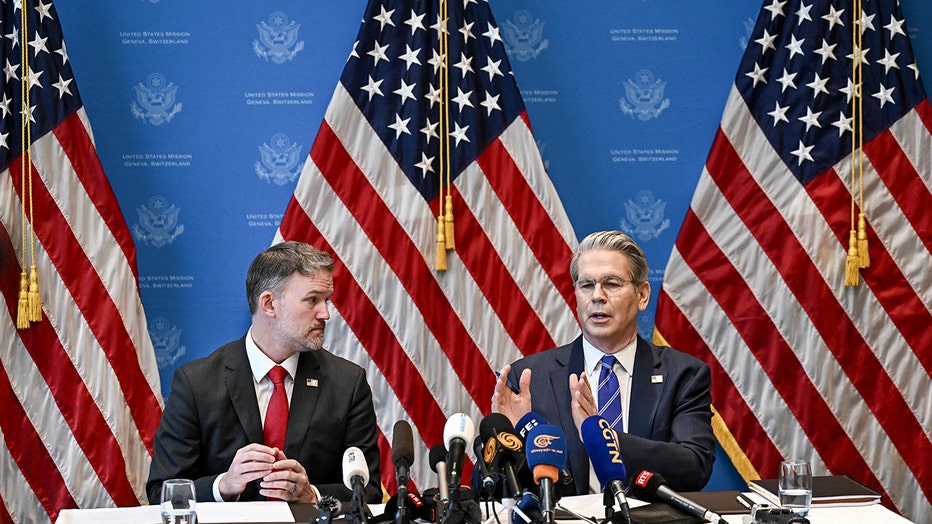US-China trade deal: Countries agree to slash tariffs, enact 90-day pause

Trump tariffs: US & China agree to 90 day pause
The US and China announced that tariffs against one another will be reduced for a 90-day pause. The White House revealed the tariffs against China will be cut by 24 percentage points. China said it will "adopt all necessary administrative measures to suspend or remove the non-tariff countermeasures taken against the United States.
U.S. and Chinese officials on Monday said a deal has been reached to slash most of their recent tariffs and the countries will implement a 90-day pause in their trade war for ongoing negotiations in resolving disputes.
U.S. Trade Representative Jamieson Greer and Treasury Secretary Scott Bessent announced the tariff reductions at a news conference in Geneva.
Here’s what to know:
US-China trade deal

Pres. Trump discusses U.S. and China trade deal
U.S. and Chinese officials have agreed to pause most tariffs for 90 days to allow for more talks on resolving their trade disputes. U.S. Trade Representative Jamieson Greer said the U.S. agreed to drop its 145% tariff rate on Chinese goods by 115 percentage points to 30%, while China agreed to lower its rate on U.S. goods by the same amount to 10%.
What we know:
Early Monday, Greer said the U.S. agreed to drop its 145% tariff rate on Chinese goods by 115 percentage points to 30%, while China agreed to lower its rate on U.S. goods by the same amount to 10%.
The two officials struck a positive tone as they said the two sides had set up consultations to continue discussing their trade issues. Bessent said at the news conference after two days of talks that the high tariff levels would have amounted to a complete blockage of each side's goods, an outcome neither side wanted.
What they're saying:
"The consensus from both delegations this weekend is neither side wants a decoupling," Bessent said. "And what had occurred with these very high tariff ... was an embargo, the equivalent of an embargo. And neither side wants that. We do want trade."
"We want more balanced trade. And I think that both sides are committed to achieving that."

US Treasury Secretary Scott Bessent (R) and US Trade Representative Jamieson Greer hold a news conference in Geneva on May 12, 2025, to give details of "substantial progress" following a two-day closed-door meeting between US and China top officials
The other side:
China’s Commerce Ministry said the two sides agreed to cancel 91% in tariffs on each other’s goods and suspend another 24% in tariffs for 90 days, bringing the total reduction to 115 percentage points.
The ministry called the agreement an important step for the resolution of the two countries’ differences and said it lays the foundation for further cooperation.
"This initiative aligns with the expectations of producers and consumers in both countries and serves the interests of both nations as well as the common interests of the world," a ministry statement said.
China hopes the U.S will stop "the erroneous practice of unilateral tariff hikes" and work with China to safeguard the development of their economic and trade relations, injecting more certainty and stability into the global economy, the ministry said.
The joint statement issued by the two countries said China also agreed to suspend or remove other measures it has taken since April 2 in response to the U.S. tariffs.
The backstory:
President Donald Trump last month raised U.S. tariffs on China to a combined 145% and China retaliated by hitting American imports with a 125% levy. Tariffs that high essentially amount to the two countries boycotting each other’s products, disrupting trade that last year topped $660 billion.
China has increased export controls on rare earths including some critical to the defense industry, and added more American companies to its export control and unreliable entity lists, restricting their business with and in China.
Big picture view:
The full impact of the complicated tariffs and other trade penalties enacted by Washington and Beijing remains unclear, and a lot depends on whether they will find ways to bridge longstanding differences during the 90-day suspension. But the announcement by the U.S. and China sent shares surging, with U.S. futures jumping more than 2%. Hong Kong’s Hang Seng index surged nearly 3% and benchmarks in Germany and France were both up 0.7%.
The Source: This story was reported based on a news conference held on May 12, 2025, in Geneva by U.S. Treasury Secretary Scott Bessent and U.S. Trade Representative Jamieson Greer. It was reported from Cincinnati, and the Associated Press contributed.

